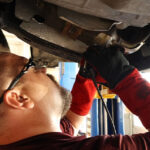
Race car and airplane tires are filled with nitrogen, so that means nitrogen will work better for regular vehicles as well, right? Not necessarily. Depending on your driving style and budget, regular air may work just as well, if not better for you. Here are some of the arguments on both sides of the debate.
WHY FILL TIRES WITH NITROGEN?
Proponents give several arguments for filling tires with nitrogen, the most common of which are 1) better maintenance of air pressure, 2) improved fuel economy, and 3) longer life of your tires.
AIR PRESSURE MAINTENANCE
Pro: Since every tire contains miniscule pores, whatever you fill it with will eventually seep out through those holes, causing your air pressure to decrease. Nitrogen molecules are larger than oxygen, meaning the nitrogen will take longer to seep out than the oxygen.
Con: However, air is already 78 percent nitrogen. (It also contains around 21 percent oxygen, as well as water vapor, CO2 and small concentrations of other gasses such as neon and argon.*) This means when you fill your tires at the gas station pump, you’re getting mostly nitrogen anyway. It’s also worth noting that tires in good condition, generally don’t leak very much.
Claims For and Against Fuel Economy
Pro: According to the EPA, for every 1 psi drop in tire pressure of all four tires, gas mileage will fall 0.2%. When your tire pressure decreases, it in-turn, increases the rolling resistance of your tires, causing a decrease in gas milage.**
Con: However, in 2008, ExxonMobil completed a study that found the use of nitrogen in tires does not significantly change a tire’s rolling resistance. That being said, it’s always a good idea to regularly check your tire pressure and keep your tires inflated according to manufacturer’s recommendations.
Tire Life
Pro: Another argument for nitrogen is to keep that water vapor mentioned above out of your tires. Any moisture inside of your tires can end up causing corrosion of the internal tire wall. Nitrogen is an inert dry gas and filling your tires with it means you will minimize any moisture in the tires.
Con: Critics of nitrogen claim that by the time any oxidation inside the tire is able to occur, the outside tread would have worn down to a point where it would be time to replace the tires anyway.
The Verdict
“Personally I don’t pay for the nitrogen service for my tires. Today’s vehicles are equipped with tire pressure monitoring systems and some vehicles, mine included, tell me the exact pressure in my tires on my dash at all times. Once a week or so I check it and adjust if necessary. In the last two years I’ve only had to adjust when the weather got really cold. My last set of tires went almost 60,000 miles so I let the results speak for themselves,” Lonnie Hinkle, COO, Jiffy Lube of Indiana.
While Jiffy Lube does not offer Nitrogen Service, we do offer new tires, tire rotations, brake service, tune-up, and suspension work and many of our locations. And as always, our Signature Service Oil Change includes checking the fluids, belts, hoses, filters, and other vital parts of your vehicle needed to keep you and your family safe on the road. Our certified technicians are happy to evaluate the areas of your vehicle that may need preventative maintenance. Find a location near you here.
*From Popular Mechanics: https://www.popularmechanics.com/cars/how-to/a3894/4302788/
**From the US Department of Energy: https://www.fueleconomy.gov/feg/maintain.jsp










